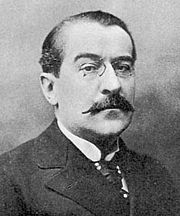- Charles Émile Picard
-
Charles Émile Picard 
Born 24 July 1856
Paris, FranceDied 12 December 1941 (aged 85)
Paris, FranceNationality  French
FrenchFields Mathematics Institutions University of Paris Alma mater École Normale Supérieure Doctoral advisor Gaston Darboux Doctoral students Sergei Bernstein
Lucien Blondel
Gheorghe Calugareanu
Paul Dubreil
Jacques Hadamard
Gaston Julia
Traian Lalescu
Philippe Le Corbeiller
Paul Painlevé
Mihailo Petrović
Simion Stoilow
Ernest Vessiot
Henri Villat
André Weil
Stanisław ZarembaKnown for Picard functor
Picard group
Picard theorem
Picard variety
Picard–Lefschetz formula
Picard–Lindelöf theorem
Painlevé transcendentsCharles Émile Picard (French pronunciation: [ʃaʁl emil pikaʁ]; 24 July 1856 – 12 December 1941) was a French mathematician. He was elected the fifteenth member to occupy seat 1 of the Académie Française in 1924.
Biography
Picard's mathematical papers, textbooks, and many popular writings exhibit an extraordinary range of interests, as well as an impressive mastery of the mathematics of his time. Modern students of complex variables are probably familiar with two of his named theorems. His lesser theorem states that every nonconstant entire function takes every value in the complex plane, with perhaps one exception. His greater theorem states that an analytic function with an essential singularity takes every value infinitely often, with perhaps one exception, in any neighborhood of the singularity. He also made important contributions in the theory of differential equations, including work on Picard–Vessiot theory, Painlevé transcendents and his introduction of a kind of symmetry group for a linear differential equation, the Picard group. In connection with his work on function theory, he was one of the first mathematicians to use the emerging ideas of algebraic topology. In addition to his path-breaking theoretical work, Picard also made important contributions to applied mathematics, including the theories of telegraphy and elasticity. His collected papers run to four volumes.
Like his contemporary, Henri Poincaré, Picard was much concerned with the training of mathematics, physics, and engineering students. He wrote a classic textbook on analysis and one of the first textbooks on the theory of relativity. Picard's popular writings include biographies of many leading French mathematicians, including his father in law, Charles Hermite.
Bibliography
- Picard, Émile (1891-1896). Traité d'Analyse. Paris: Gauthier-Villars et fils. OCLC 530823.
- Picard, Émile (1905). La science Moderne et son état Actuel. Paris: E. Flammarion. OCLC 43307396.
- Picard, Émile (1922). La Théorie de la Relativité et ses Applications à l'astronomie. Paris: Gauthier-Villars. OCLC 1025334.
- Picard, Émile (1922). Discours et Mélanges. Paris: Gauthier-Villars. OCLC 4855336.
- Picard, Émile (1931). Éloges et Discours Académiques. Paris: s.n.. OCLC 13473598.
- Picard, Émile (1978-1981). Œuvres de Ch.-É. Picard. vol. I-IV. Paris: Centre National de la Recherche Scientifique. OCLC 4615520.
External links
- "Charles Émile Picard". MacTutor Archive. http://www-history.mcs.st-andrews.ac.uk/Mathematicians/Picard_Emile.html. Retrieved June 12 2005.
- Charles Émile Picard at the Mathematics Genealogy Project.
Académie Française Seat 1 Pierre Séguier (1635) · Claude Bazin de Bezons (1643) · Nicolas Boileau-Despréaux (1684) · Jean d'Estrées (1711) · Marc-René d'Argenson (1718) · Jean-Joseph Languet de Gergy (1721) · George-Louis Leclerc, comte de Buffon (1753) · Félix Vicq-d'Azyr (1788) · François-Urbain Domergue (1803) · Ange-François Fariau (1810) · François-Auguste Parseval-Grandmaison (1811) · Narcisse-Achille de Salvandy (1835) · Émile Augier (1857) · Charles de Freycinet (1890) · Charles Émile Picard (1924) · Louis de Broglie (1944) · Michel Debré (1988) · François Furet (1997) · René Rémond (1998) · Claude Dagens (2008)
Categories:- 1856 births
- 1941 deaths
- People from Paris
- 19th-century mathematicians
- 20th-century mathematicians
- Alumni of the École Normale Supérieure
- French mathematicians
- Mathematical analysts
- Grand Croix of the Légion d'honneur
- Members of the Académie française
- Members of the French Academy of Sciences
Wikimedia Foundation. 2010.
